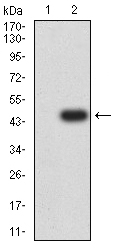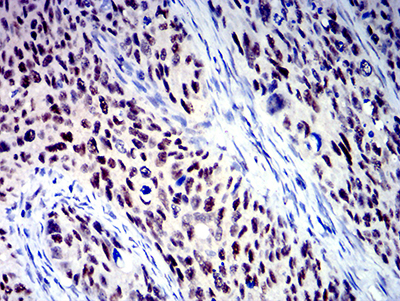-
Product Name
Anti-BCL9L antibody
- Documents
-
Description
Mouse monoclonal antibody to BCL9L
-
Tested applications
WB, IHC-P
-
Species reactivity
Human
-
Alternative names
B9L antibody; BCL9-2 antibody; DLNB11 antibody
-
Isotype
Mouse IgG1
-
Preparation
This antigen of this antibody was purified recombinant fragment of human bcl9l (aa: 606-751) expressed in e. coli.
-
Clonality
Monoclonal
-
Formulation
Liquid, 1*PBS with 0.05% sodium azide.
-
Storage instructions
Store at +4℃ after thawing. Aliquot store at -20℃. Avoid repeated freeze / thaw cycles.
-
Applications
WB: 1:500-1:2,000
IHC-P: 1:50-1:200
-
Validations

Fig1: Western blot analysis of BCL9L against human BCL9L (AA: 606-751) recombinant protein. Proteins were transferred to a PVDF membrane and blocked with 5% BSA in PBS for 1 hour at room temperature. The primary antibody ( 1/500) was used in 5% BSA at room temperature for 2 hours. Goat Anti-Mouse IgG - HRP Secondary Antibody at 1:5,000 dilution was used for 1 hour at room temperature.

Fig2: Western blot analysis of BCL9L against HEK293 (1) and BCL9L (AA: 606-751)-hIgGFc transfected HEK293 (2) cell lysate. Proteins were transferred to a PVDF membrane and blocked with 5% BSA in PBS for 1 hour at room temperature. The primary antibody ( 1/500) was used in 5% BSA at room temperature for 2 hours. Goat Anti-Mouse IgG - HRP Secondary Antibody at 1:5,000 dilution was used for 1 hour at room temperature.

Fig3: Immunohistochemical analysis of paraffin-embedded cervical cancer tissue using anti-BCL9L antibody. The section was pre-treated using heat mediated antigen retrieval with Tris-EDTA buffer (pH 8.0) for 20 minutes. The tissues were blocked in 5% BSA for 30 minutes at room temperature, washed with ddH2O and PBS, and then probed with the primary antibody ( 1/100) for 30 minutes at room temperature. The detection was performed using an HRP conjugated compact polymer system. DAB was used as the chromogen. Tissues were counterstained with hematoxylin and mounted with DPX.
- Background
-
References
- Oncotarget. 2014 Aug 30;5(16):6770-87.
- Gastroenterology. 2011 Oct;141(4):1359-70, 1370.e1-3.
Related Products / Services
Please note: All products are "FOR RESEARCH USE ONLY AND ARE NOT INTENDED FOR DIAGNOSTIC OR THERAPEUTIC USE"
